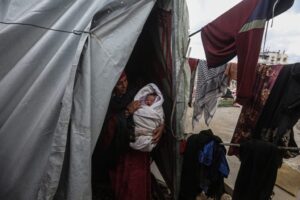The war where women’s bodies lost their rights

Mother and baby in a tent, Beit Lahia, northern Gaza, 20 February 2025
Mariam Khateeb writes in Mondoweiss on 19 May 2025:
In October, I bled for ten days without access to a proper bathroom.
The house we fled to — like most shelters in Gaza — had no privacy. Forty people slept in two rooms. The bathroom had no door, only a torn curtain. I remember waiting for everyone to sleep so I could clean myself with a bottle of water and scraps of cloth. I remember praying I wouldn’t stain the mattress I shared with three cousins. I remember the shame — not of my body, but of being unable to care for it.
In war, the body loses its rights, especially the female body. The headlines rarely speak of this, of what it means for a girl to get her period under bombardment, of mothers forced to bleed in silence and miscarry on cold floors or give birth under drones. The war in Gaza is not only a story of rubble and airstrikes. It is a story of bodies interrupted, invaded, and denied rest. And yet, somehow, these bodies continue.
As a Palestinian woman and a displaced student now living in Egypt, I carry this bodily memory with me. Not as a metaphor, but as a fact. My body still flinches at loud noises. My digestion falters. My sleep comes in fragments. I know many women — friends, relatives, neighbors — who have developed chronic illnesses during the war, who lost their periods for months, whose breasts dried up while trying to breastfeed in shelters. War enters the body like an illness and stays.
The Gazan body is a map of interruption. It learns early to contract itself — to take up less space, to stay alert, to suppress desire, hunger, bleeding. The public nature of displacement destroys privacy, while the constant fear gnaws at the nervous system. Women who once guarded their modesty now change clothes in front of strangers. Girls stop talking about their cycles. Dignity becomes a burden no one can afford.
